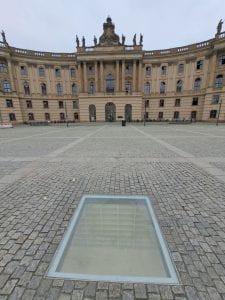Recognition
An Interpretive Blog of Germany
Meg Brosneck
After visiting France and Poland and finding only denial of past antisemitism, Germany was a breath of fresh air. I’d heard that modern day Germany had done well in acknowledging the sins of its past, but the museums and memorials we visited exceeded my expectations.

The Empty Library memorial
The Germans have dedicated many museums to educating people on the corrupt actions of the Nazis. The Topography of Terror Museum, for example, was devoted almost exclusively to their murderous actions. Just by walking through Berlin, one is likely to stumble upon some kind of memorial to the victims of the Nazis’ actions: for example, “The Empty Library” in front of Humboldt University of Berlin, dedicated to the books the Nazis burned in May of 1933. But the Germans went further than just recognizing the Nazi leadership’s role in the terror; they make clear that average citizens played a large role in the terror too.

The Archive of German Members of Parliament
Many of the museums specify that most citizens supported the Nazis. Even the German Resistance Museum, dedicated to those who stood against the Nazis, stated that less than one percent of the population resisted. The majority were complicit. In the Reichstag, the home of the German Parliament, there is an art installation called the “Archive of German Members of Parliament” which showcases the names of every member of the German parliament throughout the 20th century. Many are Nazis, and Adolf Hitler is included. This exhibit includes those names to emphasize that those Nazis rose to power under the electoral system of the Weimar Republic; it was the German people who elected and brought them to power, and that needs to be remembered so it won’t be repeated. This open acknowledgment of the past is honorable. It’s not easy to admit the horrors of your country’s past—many countries refuse to—but this recognition is the only way a country can move forward.
I find myself comparing Germany to the US, where it is becoming more and more difficult to discuss our country’s shameful past of imperialism, slavery, and genocide. We have a lot to learn from Germany, and I can only hope one day we’ll follow their example.

From the Topography of Terror Museum in Berlin